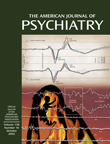Catatonia and Transcranial Magnetic Stimulation
Ms. A, an 18-year-old woman, was brought to the hospital in a catatonic state, according to DSM-IV criteria. She had no personal or family history of psychiatric disease. She was socially involved and was attending school regularly. Seven months before, she had experienced social withdrawal, a decline in school performance, panic attacks, and marked behavioral disturbances. Four days before hospitalization, she had developed acute catatonic syndrome.When we examined Ms. A, her catatonic symptoms were found to involve mutism, waxy flexibility, negativism, rigidity, and catalepsy. Her symptoms were rated with the Bush Francis Catatonia Rating Scale (6) at baseline and every 3 days thereafter. After the failure of a short trial (3 days) of lorazepam, she was treated with fast repetitive TMS of the left dorsolateral prefrontal cortex for 2 weeks (10 sessions, 1600 stimuli/day, 10 Hz, 80% of the motor threshold).Almost all of her catatonic symptoms had disappeared by the end of the TMS treatment, allowing a diagnosis of schizophrenia, according to the clinical picture (auditory hallucinations and delusions). The severity of the catatonic symptoms on the catatonia rating scale had dropped from 19 at baseline to 3 by days 12 and 15. Antipsychotic medication (amisulpride, 600 mg b.i.d.) was then initiated. Ms. A was discharged 4 weeks later.
References
Information & Authors
Information
Published In
History
Authors
Metrics & Citations
Metrics
Citations
Export Citations
If you have the appropriate software installed, you can download article citation data to the citation manager of your choice. Simply select your manager software from the list below and click Download.
For more information or tips please see 'Downloading to a citation manager' in the Help menu.
View Options
View options
PDF/EPUB
View PDF/EPUBGet Access
Login options
Already a subscriber? Access your subscription through your login credentials or your institution for full access to this article.
Personal login Institutional Login Open Athens loginNot a subscriber?
PsychiatryOnline subscription options offer access to the DSM-5-TR® library, books, journals, CME, and patient resources. This all-in-one virtual library provides psychiatrists and mental health professionals with key resources for diagnosis, treatment, research, and professional development.
Need more help? PsychiatryOnline Customer Service may be reached by emailing [email protected] or by calling 800-368-5777 (in the U.S.) or 703-907-7322 (outside the U.S.).

